Epic: Difference between revisions
>LegacymtgsalvationUser1033 |
>RivalRowan (Repaired link rot.) |
||
| (66 intermediate revisions by 27 users not shown) | |||
| Line 1: | Line 1: | ||
'''Epic''' is a [[keyword ability]] that | {{Infobox keyword | ||
{{ | | name = Epic | ||
| type = Spell | |||
| type2 = Spell | |||
| first = Saviors of Kamigawa | |||
| last = Saviors of Kamigawa | |||
| reminder = For the rest of the game, you can't cast spells. At the beginning of each of your upkeeps, copy this spell except for its epic ability. You may choose new targets for the copy. | |||
| storm = 9 | |||
| storm_ref=<ref>{{EzTumblr|http://markrosewater.tumblr.com/post/682460061910663168/|title=Where is epic on the storm scale...|2022-04-24}}</ref> | |||
| stats = {{stats|W=1|U=1|B=1|R=1|G=1}} | |||
}}{{TOCright}} | |||
'''Epic''' is a [[keyword ability]] of five sorceries from ''[[Saviors of Kamigawa]]''. In keeping with that block's legendary theme, its design is intended to provide an answer to the question "What does it mean for an instant or sorcery to be legendary?"<ref>{{DailyRef|making-magic/epic-struggles-2005-05-09-0|Epic Struggles|[[Mark Rosewater]]|May 9, 2005|archiveurl=https://web.archive.org/web/20230208162337/https://magic.wizards.com/en/news/making-magic/epic-struggles-2005-05-09-0|archivedate=January 28, 2022}}</ref> | |||
== History == | |||
The ability has appeared on only one [[cycle]] of five cards, all [[sorcery|sorceries]]: | |||
* White: <c>Enduring Ideal</c> (Search your library for an enchantment and put it onto the battlefield) | |||
* Blue: <c>Eternal Dominion</c> (Search target opponent's library for a non-planeswalker permanent and put it onto the battlefield) | |||
* Black: <c>Neverending Torment</c> (Exile cards from target opponent's library equal to the number of cards in your hand) | |||
* Red: <c>Undying Flames</c> (Deal damage to target creature or player equal to the CMC of the first nonland card you exile from the top of your library) | |||
* Green: <c>Endless Swarm</c> (Get a 1/1 token for each card in your hand) | |||
<center>[[Image:MTG - Enduring Ideal.JPG|150px]][[Image:MTG - Eternal Dominion.JPG|150px]][[Image:MTG - Neverending Torment.JPG|150px]][[Image:MTG - Undying Flames.JPG|150px]][[Image:MTG - Endless Swarm.JPG|150px]]</center> | |||
==Description== | |||
An epic spell is copied in its controller's upkeep on every turn for the rest of the game. If it has any targets, the player may choose new targets for the copy. | |||
In exchange for this powerful ability, the player can't cast spells for the rest of the game. Since copies of a spell aren't cast, the epic spell's copies aren't affected. | |||
According to [[Mark Rosewater]], Epic is probably the mechanic with the least design space.<ref>{{EzTumblr|https://markrosewater.tumblr.com/post/189175414093/which-mechanic-named-or-not-has-far-and-away-the|title=Which mechanic, named or not, has far and away the least design space?|November 19, 2019}}</ref> | |||
==Rules== | |||
{{CR+G}} | |||
==Notes== | |||
<!-- This section used to be called "Rulings", but no source was given for them and they're not on Gatherer, so they should not be taken as official statements. --> | |||
*The copy of the spell put onto the stack doesn't have the epic ability, so exactly one copy is put onto the stack at the beginning of each of your upkeeps. (You don't get one, then two, then four copies, and so on.) | |||
*Choices made while casting the original epic spell, as well as any alterations made to that spell, are copied. However, the epic ability does allow the player to choose a new target as the copy is put onto the stack. | |||
*A copy of a spell is still a spell, and it can be countered. | |||
*A player can't cast spells once they resolve a spell with epic, but that player can still activate abilities, their static and triggered abilities still work, and they can still attack and block. | |||
*Putting a copy of a spell on the stack is not the same as casting a copy of a card. Abilities that put copies of spells directly on the stack work after the epic spell has resolved. Abilities that create copies of cards that you can cast still create the copies, but you can't cast them. | |||
*The copy ability is unusual in that there is no discernable source and no visual reminder (such as if the Epic spell is shuffled into its owner's library). | |||
==Interactions== | ==Interactions== | ||
Here is a list of things an owner of | Here is a list of things an owner of an epic spell can do after an epic spell has been played and resolved. | ||
* | *They still have all phases, which means they will still untap, draw, attack, block, discard (using [[madness]], however, is not allowed; it is casting a spell for an alternative cost), etc. | ||
* | *They can still play lands; this is a game action that only requires the stack to be empty and the player to have priority during a main phase of their turn. | ||
* | *They can use activated abilities on permanents of theirs that are on the battlefield. | ||
* | *They can use abilities which work outside of the battlefield. For example, you can [[cycling|cycle]] cards as this isn't playing spells. (Some cycling actually triggers some abilities on the cycled card, e.g. when <c>Decree of Pain</c> is cycled, all creatures get -2/-2 until end of turn; this is still not casting.) | ||
* | *They can put a copy of a spell on the stack (e.g. <c>Chain Lightning</c>). | ||
*They can use [[channel]] abilities. | |||
{{ | ==Examples== | ||
{{examples|<c>Endless Swarm</c> {{5}}{{G}}{{G}}{{G}}<br>Sorcery<br>Create a 1/1 green Snake creature token for each card in your hand.<br>Epic ''(For the rest of the game, you can't cast spells. At the beginning of each of your upkeeps, copy this spell except for its epic ability.)''}} | |||
}} | |||
==References== | |||
{{Reflist}} | |||
{{Mechanics|keyword}} | |||
Latest revision as of 22:09, 3 November 2023
| Epic | |
|---|---|
| Keyword Ability | |
| Type |
Spell (1st ability) Spell (2nd ability) |
| Introduced | Saviors of Kamigawa |
| Last used | Saviors of Kamigawa |
| Reminder Text | Epic (For the rest of the game, you can't cast spells. At the beginning of each of your upkeeps, copy this spell except for its epic ability. You may choose new targets for the copy.) |
| Storm Scale | 9[1] |
| Statistics |
5 cards |
| Scryfall Search | |
| keyword:"Epic" | |
Epic is a keyword ability of five sorceries from Saviors of Kamigawa. In keeping with that block's legendary theme, its design is intended to provide an answer to the question "What does it mean for an instant or sorcery to be legendary?"[2]
History
The ability has appeared on only one cycle of five cards, all sorceries:
- White: Enduring Ideal (Search your library for an enchantment and put it onto the battlefield)
- Blue: Eternal Dominion (Search target opponent's library for a non-planeswalker permanent and put it onto the battlefield)
- Black: Neverending Torment (Exile cards from target opponent's library equal to the number of cards in your hand)
- Red: Undying Flames (Deal damage to target creature or player equal to the CMC of the first nonland card you exile from the top of your library)
- Green: Endless Swarm (Get a 1/1 token for each card in your hand)
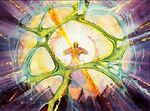
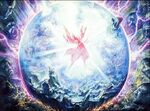
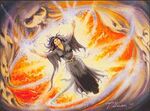
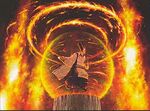
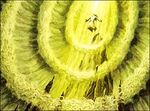
Description
An epic spell is copied in its controller's upkeep on every turn for the rest of the game. If it has any targets, the player may choose new targets for the copy.
In exchange for this powerful ability, the player can't cast spells for the rest of the game. Since copies of a spell aren't cast, the epic spell's copies aren't affected.
According to Mark Rosewater, Epic is probably the mechanic with the least design space.[3]
Rules
From the glossary of the Comprehensive Rules (June 7, 2024—Modern Horizons 3)
- Epic
- A keyword ability that lets a player copy a spell at the beginning of each of their upkeeps at the expense of casting any other spells for the rest of the game. See rule 702.50, “Epic.”
From the Comprehensive Rules (June 7, 2024—Modern Horizons 3)
- 702.50. Epic
- 702.50a Epic represents two spell abilities, one of which creates a delayed triggered ability. “Epic” means “For the rest of the game, you can’t cast spells,” and “At the beginning of each of your upkeeps for the rest of the game, copy this spell except for its epic ability. If the spell has any targets, you may choose new targets for the copy.” See rule 707.10.
- 702.50b A player can’t cast spells once a spell with epic they control resolves, but effects (such as the epic ability itself) can still put copies of spells onto the stack.
Notes
- The copy of the spell put onto the stack doesn't have the epic ability, so exactly one copy is put onto the stack at the beginning of each of your upkeeps. (You don't get one, then two, then four copies, and so on.)
- Choices made while casting the original epic spell, as well as any alterations made to that spell, are copied. However, the epic ability does allow the player to choose a new target as the copy is put onto the stack.
- A copy of a spell is still a spell, and it can be countered.
- A player can't cast spells once they resolve a spell with epic, but that player can still activate abilities, their static and triggered abilities still work, and they can still attack and block.
- Putting a copy of a spell on the stack is not the same as casting a copy of a card. Abilities that put copies of spells directly on the stack work after the epic spell has resolved. Abilities that create copies of cards that you can cast still create the copies, but you can't cast them.
- The copy ability is unusual in that there is no discernable source and no visual reminder (such as if the Epic spell is shuffled into its owner's library).
Interactions
Here is a list of things an owner of an epic spell can do after an epic spell has been played and resolved.
- They still have all phases, which means they will still untap, draw, attack, block, discard (using madness, however, is not allowed; it is casting a spell for an alternative cost), etc.
- They can still play lands; this is a game action that only requires the stack to be empty and the player to have priority during a main phase of their turn.
- They can use activated abilities on permanents of theirs that are on the battlefield.
- They can use abilities which work outside of the battlefield. For example, you can cycle cards as this isn't playing spells. (Some cycling actually triggers some abilities on the cycled card, e.g. when Decree of Pain is cycled, all creatures get -2/-2 until end of turn; this is still not casting.)
- They can put a copy of a spell on the stack (e.g. Chain Lightning).
- They can use channel abilities.
Examples
Example
Endless Swarm ![]()
![]()
![]()
![]()
Sorcery
Create a 1/1 green Snake creature token for each card in your hand.
Epic (For the rest of the game, you can't cast spells. At the beginning of each of your upkeeps, copy this spell except for its epic ability.)
References
- ↑ Mark Rosewater (2022-04-24). "Where is epic on the storm scale...". Blogatog. Tumblr.
- ↑ Mark Rosewater (May 9, 2005). "Epic Struggles". magicthegathering.com. Wizards of the Coast. Archived from the original on January 28, 2022.
- ↑ Mark Rosewater (November 19, 2019). "Which mechanic, named or not, has far and away the least design space?". Blogatog. Tumblr.